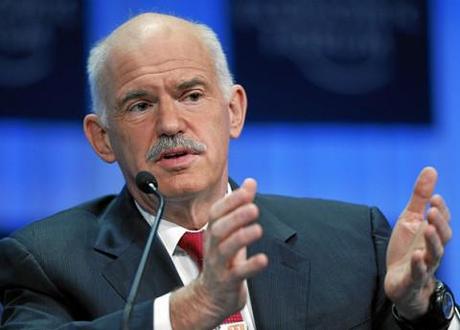
Fighting off critics: Greek PM George Papandreou. Photo credit: World Economic Forum, http://flic.kr/p/9dzUhz
Greek prime minister George Papandreou is under fire from all sides following his decision to call a referendum on whether to accept the proposed EU bailout package. Six senior members of his Pasok party have called for his resignation and an MP has quit in protest; Greek opposition parties have blasted the decision; a parliamentary confidence vote on Friday may topple his government; and EU leaders have summoned him to an emergency meeting. What’s next?
Fears for Greece. Peter Paschalis wrote in The Independent that Greek commerce groups are deeply concerned about the decision to call a referendum given the parlous state of the national economy, and with foreign investor confidence in the country already low.
European instability. A leading article in The Independent was highly critical of Papandreou, accusing him of acting in “shameful bad faith” and pointing out that he failed to warn EU leaders about the proposed referendum. Whatever the actual result of the referendum, said The Independent, the announcement will have serious repercussions for Europe over the coming weeks, destabilising financial markets and undermining talks to firm up the eurozone rescue plan: “That is bad news for Greece, bad news for Europe, and bad news for Britain.”
Default. Writing on The Guardian‘s Comment is Free, Costas Lapavitsas argued that the Greek referendum is “probably the final bell before Greece defaults and quits the euro”. Lapavitsas said that the consequences of this were “incalculable”, but that Greek withdrawal from the euro would likely spell the end of the monetary union.
EU to blame. However, Lapavitsas also wrote that Papandreou called the referendum because Greece has become “increasingly ungovernable through successive European Union rescue packages”, as public unrest has surged in response to austerity measures. Lapavitsas argued that EU leaders hadn’t intended to force Greece out of the eurozone but that they had failed to fully comprehend the unpopularity of the stringent measures they imposed on the country in the name of reducing government debt.
“The Greek economy is expected to contract by 5.5 per cent this year, and the recession will likely continue for a fourth consecutive year in 2012″, wrote Peter Paschalis in The Independent.
Best of the worst. While sympathetic to Papandreou’s position, a Washington Post editorial suggested a referendum would be a mistake – not because the bailout plan is guaranteed to help Greece, but because it’s the best option for European stability: “The package is the best hope to avoid a sudden recession in Europe that could reverberate around the globe; without calm and confidence in the markets, even that hope fades.”
“The referendum will be a clear mandate and a clear message in and outside Greece on our European course and participation in the euro,” Greek PM George Papandreou told his cabinet, reported Ekathimerini.
Power to the people. Writing in The Telegraph, Conservative MEP Daniel Hannan said that the horror in Brussels over Papandreou’s decision comes down to the fact that the EU does not respect democracy: “The first rule of the Eurocracy is ‘no referendums’. Brussels functionaries believe that their work is too important to be subject to the prejudices of hoi polloi,” he wrote. Hannan argued that the Greek prime minister is in fact keen to stay in the eurozone – the problem for EU leaders is that Papandreou is also “keen on democracy.”
Change to the EU. Daniel Finkelstein wrote in The Times (£) that the nature of the EU will fundamentally change, with national democracy supplanted by a “European state”. Finkelstein argued that the Greece referendum announcement shows that the current system is not adequate to support the bailout plan, and the only solution is closer integration of eurozone countries: “Fiscal union requires shared democratic control”, he said.
More money for Greece. Matthew Lynn suggested in The Daily Mail that there may be more to Papandreou’s decision than respect for national democracy: “Recognising that Brussels is terrified of a Greek default, which could bring about the collapse of the entire eurozone, he could now be exploiting popular anger in Greece at the imposition of austerity measures to win an ever bigger bailout and an even greater debt write-off by the foreign banks”, he wrote. But the real problem, according to Lynn, is that Greece is so, well, Greek. Scrupulously avoiding sweeping generalisations, Lynn argued that “Greeks have never minded defaulting on their debts”, “Greece has always had a siege mentality” and that the country is “nothing like the advanced societies of Northern Europe.” So that’s Greece told.

